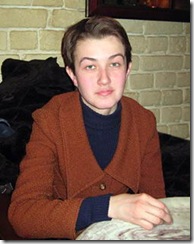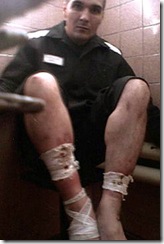Senior MP Says 33 Held over Mukhrovani Mutiny
Civil Georgia, Tbilisi / 23 May.'09 / 01:16
http://www.civil.ge/eng/article.php?id=20973
A senior lawmaker from the ruling party, Givi Targamadze, said that total of 33 persons were arrested in connection to the Mukhrovani mutiny.
MP Targamadze, who chairs parliamentary committee for defense and security, said in Rustavi 2 TV’s weekly program, Position, late on May 22, that 32 persons remained in pre-trial detention and one was released on bail.
Twelve out of 32 persons remaining in the police custody are civilians and twenty – military officers, MP Givi Targamadze said.
He also said that relatives of one of key suspects, Koba Otanadze, who according to the Interior Ministry was injured and arrested in a police shootout late on May 20, were held briefly by the police for interrogation. He said that information obtained as a result of those interrogations helped the police to arrest Otanadze. Another suspect, Levan Amiridze, was also injured and arrested and the third one – Gia Krialashvili was killed in the shootout with the police, according to the Interior Ministry.
Otanadze’s brother, Jimsher Otanadze, the latter’s wife and their son were detained by the police at about 3am on May 20. But their detention was not formally registered by the police and defense lawyer and representatives of the Public Defender’s Office were not able to find detainees’ whereabouts. They were released about 21 hours later after the arrest of Koba Otanadze. After their release it emerged that at least 11 other relatives of Otanadze were also detained in the same period. Otanadze’s defense lawyer, Onise Mebonia, said that this type of detention amounted to kidnapping.
The Interior Ministry made the first official statement on the matter on May 22 in which it confirmed detention of “some of the family members of Koba Otanadze” citing that some of them were held with status of “suspects” and others with status of “witnesses.” It also said that information obtained from their questioning helped the police to arrest Otanadze.
Another brother of Koba Otanadze, Nugzar Otanadze, was also arrested a week after the Mukhrovani incident. He was charged with resisting police and sent to a two-month pre-trial detention. The defense lawyer said Nugzar Otanadze was beaten and “tortured” by the police after the arrest; the Interior Ministry denied that and said Nugzar Otanadze sustained injured while resisting the police arrest.
Senior MP Claims Russian Link to Mukhrovani Mutiny
Civil Georgia, Tbilisi / 23 May.'09 / 02:41
http://www.civil.ge/eng/article.php?id=20974
Givi Targamadze, an influential lawmaker from the ruling party, claimed that the failed Mukhrovani mutiny was sponsored by a Russia-based tycoon with links to Russian PM, Vladimir Putin.
MP Givi Targamadze, who chairs the parliamentary committee for defense and security, said while speaking at the Rustavi 2 TV’s weekly program, Position, late on May 22 that the goal of the plot was “to at least trigger disorders” in Georgia or “at maximum to pave the way for entry of the Russian occupation forces in Tbilisi.”
“I have been refraining from naming a person who has organized everything, unless this person himself announced that after this failed mutiny he could no longer wait and would run for presidency in the next elections – this is Mr. Ebralidze; and if there is someone who may think that in Today’s Russia it is possible to be a billionaire oligarch in St. Petersburg uncontrolled by the most famous St. Petersburgian, i.e. [Russia’s PM Vladimir] Putin, is very wrong,” MP Givi Targamadze said.
Alexander Ebralidze is a St. Petersburg-based tycoon, an ethnic Georgian originally from Batumi, who has been living in Russia for over thirty years already. This month he announced having ambition to become a president of Georgia. He made the announcement at an “assembly of peoples of Georgia” in Sochi. The announcement triggered protest of some of those participants of the event, who arrived in Sochi from Tbilisi; outspoken critics of the Georgian authorities were among those participants who walked out from the meeting hall after Ebralidze’s announcement. After announcing about his presidential ambitions, Ebralidze said: “I have been waiting for 20 years, but now I am giving up my modesty.”
He also said that starting from January, 2009 several meetings were held in “one of the CIS-member states”, which he did not specify, with participation of “some of the mutineers” with a purpose of plotting the mutiny.
“These meetings were held under the leadership of Tariel Oniani [Russia-based criminal authority] and Bondo Shalikiani,” MP Givi Targamadze said.
On May 18 President Saakashvili said that Bondo Shalikiani was among “active sponsors” of the ongoing protests in Georgia. Shalikiani, a former lawmaker and once a tycoon with assets in western Georgian region of Imereti, was arrested in early 2004 for alleged embezzlement, but was released after agreeing to hand over some of his assets to the authorities. He then left for Russia and resides there. On May 18, the Georgian weekly, Kviris Palitra, published an interview with Shalikiani in which he says: “I will spare no efforts to make him [Saakashvili] held responsible for everything he has done.”
A month before the launch of ongoing protests, Vano Merabishvili, the interior minister, said on March 6 that Tariel Oniani and some other former Georgian officials who fled the country after the Rose Revolution would be among sponsors of the Georgian opposition to help them organize protests.
“But at the same time I want to tell you that these people are not key figures who will finance the Georgian opposition or other provocations that may take place in Georgia; such sponsors will be more serious figures,” Merabishvili said on March 6.

